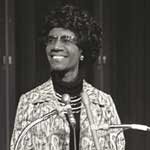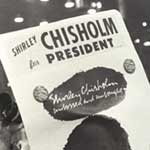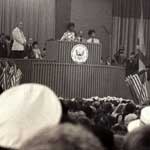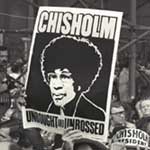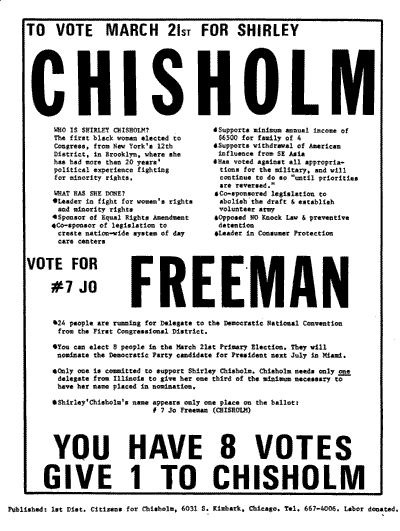Shirley Chisholm's 1972 Presidential Campaign
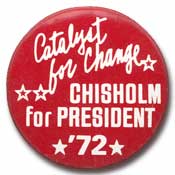 In July of 1971 Shirley Chisholm, Member of Congress from New York's Twelfth District, began to explore the possibility of running for President. When she formally announced her candidacy the following January 25, she became the first woman and the first African-American to seek the nomination of the Democratic Party for the nation's highest office. A few other women and other blacks had run on minor party tickets, and Sen. Margaret Chase Smith (R. Me) had campaigned for the Republican Party's nomination in 1964, but Chisholm's candidacy was a double first for the Democrats.
In July of 1971 Shirley Chisholm, Member of Congress from New York's Twelfth District, began to explore the possibility of running for President. When she formally announced her candidacy the following January 25, she became the first woman and the first African-American to seek the nomination of the Democratic Party for the nation's highest office. A few other women and other blacks had run on minor party tickets, and Sen. Margaret Chase Smith (R. Me) had campaigned for the Republican Party's nomination in 1964, but Chisholm's candidacy was a double first for the Democrats.
As soon as I heard that she might run, I knew that I had found my candidate. I quickly learned that Chisholm was running a grass roots campaign, in which it was up to the grass roots to figure out what needed to be done and to do it. What was needed in Illinois, where I lived while attending grad school at the University of Chicago, was to get her name on the ballot for the March primary.
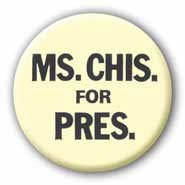
That was easier said than done. Not liking the Daley machine which ran the Democratic Party in Chicago, I had not been active in the local Democratic Party. I soon found out that Illinois would not have a Presidential preference primary in 1972; individuals would run for delegate to the Democratic Convention from each Congressional District, committed to a specific candidate or uncommitted. Only those Presidential candidates who had delegates running in a specific District committed to that candidate would appear on a District ballot. The Daley machine would run a complete slate of 59 in all of Chicago's Congressional Districts that was officially uncommitted. Unofficially, the Daley delegates would vote the way Mayor Daley wanted them to; controlling a bloc of votes gave him a lot of power at Democratic Conventions.
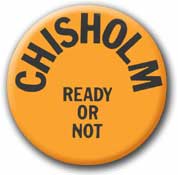
Shirley Chisholm had been breaking barriers and challenging conventions for many years. Born in Brooklyn, NY of West Indian parents, she was the first black woman to sit in Congress. Prior to her election in 1968 she had served in the New York Assembly for four years, following a professional career in child care and early childhood education. To be elected from her mostly black Brooklyn district, she had defied what was left of the Brooklyn Democratic machine. "Unbossed and unbought" was her slogan. On entering the House she had refused a place on the Forestry Subcommittee of the Agriculture Committee because she thought it was irrelevant to someone with her background from a poor, urban district. She was reassigned to Veterans Affairs; eventually she added a seat on her Committee of choice, Education and Labor. She deliberately hired a staff of young women, half of whom were black, for all of her office positions, not just the lower level ones usually occupied by women. Her first term she sponsored a bill to finance day care facilities; it passed Congress only to be vetoed by President Nixon.
It's unusual for any Member of the House to run for President, especially after serving only three years, but Chisholm was used to doing the unusual. Of course, she didn't run with the expectation of being nominated, or to increase her clout in Congress. She ran "to give a voice to the people the major candidates were ignoring."
Although Chisholm made a point of saying that she was not the women's candidate, she had always been a strong supporter of women's rights. 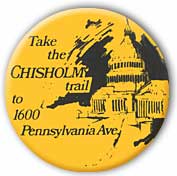 One of the four founders of the National Women's Political Caucus in 1971, she often said that during her twenty years in local politics "I had met far more discrimination because I am a woman than because I am black." Indeed Shirley Chisholm was so outspoken in favor of women's rights that she was often criticized for not paying enough attention to black issues.
One of the four founders of the National Women's Political Caucus in 1971, she often said that during her twenty years in local politics "I had met far more discrimination because I am a woman than because I am black." Indeed Shirley Chisholm was so outspoken in favor of women's rights that she was often criticized for not paying enough attention to black issues.
I encountered this negative attitude toward Chisholm by black leaders when I went to Operation PUSH, headed by Rev. Jesse Jackson, for help getting on the ballot. Its headquarters was in the First Congressional District, on the other side of the University of Chicago from where I lived. I found no support, just mild disdain.
Relying largely on my fellow grad students for help in petitioning, I was one of four people in the state of Illinois to get enough signatures to appear on the primary ballot committed to Shirley Chisholm, and the only one from a majority black district. When our campaign wrote her that she would be on the ballot in the First District of Illinois, she sent us 100 buttons, 20 bumper stickers and nine position papers on foreign affairs. Everything else we created ourselves. We used an initial $200 in contributions to buy 1,000 buttons, and the money from selling those to pay for ads and to print literature.
Florida was the first state where Chisholm actively campaigned, largely because it had "blacks, youth and a strong women's movement" and there were a lot of people in Florida eager to organize for her. However, she didn't have enough money to hire professionals and the volunteers often competed against each other rather than working together. Since she also had to attend to Congressional duties in Washington, Chisholm could only make two campaign tours in Florida before the March 14 primary. A Southern state, the big issue was busing "to correct racial imbalance" in the schools, an issue about which the candidate was ambivalent. Despite large and enthusiastic crowds wherever Chisholm spoke, she got only four percent of the vote.
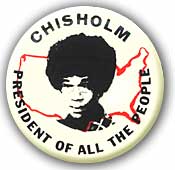 Chisholm continued her campaign wherever she could get on the ballot and had enough volunteers to set up speaking events. She campaigned in New York, New Jersey, California, Massachusetts, Minnesota, Michigan and North Carolina. There were some states in which Chisholm was on the ballot but never had time to visit (e.g. Wisconsin). And others in which she won delegates despite a single appearance (Minnesota). And still more in which she received write-in votes, or votes via delegate candidates (e.g. Illinois). Overall, people in fourteen states voted for Shirley Chisholm for President, in some fashion or other. After six months of campaigning in eleven primaries she had twenty-eight delegates committed to vote for her at the Democratic Convention.
Chisholm continued her campaign wherever she could get on the ballot and had enough volunteers to set up speaking events. She campaigned in New York, New Jersey, California, Massachusetts, Minnesota, Michigan and North Carolina. There were some states in which Chisholm was on the ballot but never had time to visit (e.g. Wisconsin). And others in which she won delegates despite a single appearance (Minnesota). And still more in which she received write-in votes, or votes via delegate candidates (e.g. Illinois). Overall, people in fourteen states voted for Shirley Chisholm for President, in some fashion or other. After six months of campaigning in eleven primaries she had twenty-eight delegates committed to vote for her at the Democratic Convention.
California was a special case, because state law gave all of the delegates to the winner, despite national Democratic Party rules requiring that they be apportioned. McGovern won California; Chisholm came in third with a tenth of his votes— enough to entitle her to twelve of California's 271 delegates under the national rules. The primacy of state law would be challenged at the convention.
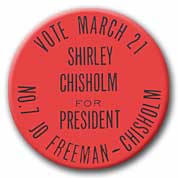
Chisholm made only one appearance in Chicago, where she spoke at Malcolm X Junior College on the west side of the city on March 6. Her two Chicago delegate candidates were running in districts on the north and south sides of the city, but no free venue could be found in either place. Jesse Jackson's Operation PUSH, which owned its own building (a former synagogue) on the South Side, had declined to invite her to speak there, even though it regularly had some of the best speakers of a liberal persuasion (black and white) in the country.
The Illinois primary was one week after Florida's. Of course I didn't win; the Daley machine's uncommitted candidates won all eight delegate slots in the First District. But in a field of 24 I came in ninth, beating people committed to Sens. George McGovern and Edward M. Kennedy. The next day I read about a challenge to the Daley delegation, which had made no attempt to comply with new Party guidelines requiring that delegations reflect the composition of their districts by race, sex and age. I immediately joined in.
Meeting in June, the Credentials Committee voted that national rules trumped state law in both California and Illinois; the challenge delegations would be seated. However, when the Committee report and recommendations went before the full convention on Monday night in July, the recommendation on California was reversed and all of the McGovern delegates were seated. That decision gave McGovern a lock on the nomination. All the candidate nominations and speeches after that were just window dressing.
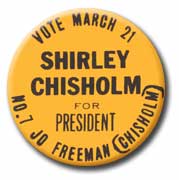
I was not a delegate at this convention, but an alternate. Since the election could not be held over again, the decision about who the Chicago challenge delegates should be was made at meetings of the people who had run for delegate in each District. When I arrived prepared to argue that Chisholm was entitled to at least one delegate because she had received more votes in the First District than anyone else, I found that a pre-meeting had been held and the delegates already agreed upon. Under the affirmative action rules only one of the eight First District delegates could be white, and that slot had been given to the head of the McGovern slate. Six of the seven blacks chosen had run committed to different candidates. One, Jesse Jackson, had not run at all. However, the three alternates had not been pre-selected, so I became the first alternate from the First District.
At the convention I lobbied the eight First District delegates to give one vote to Chisholm, but without success. All eight wanted to feel like they were part of the winning team, and a token vote for a losing candidate was not the way to do that. When the role call was held on Wednesday, Shirley Chisholm received 151.95 votes, including 4.5 from Illinois. None came from Illinois' First District, even though she had received more votes in the primary from those voters than had McGovern, who got all eight delegate votes. Many of Chisholm's 151.95 votes came from people who had come to the Democratic convention committed to other candidates, and become disenchanted when the race for the nomination ended on Monday. Ohio delegates gave her 23 votes, even though the Ohio voters hadn't given her any.
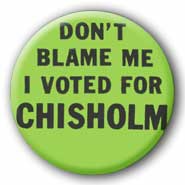
In the primaries and at the convention Chisholm received stronger support from grassroots feminists and blacks than she did from those identified as leaders. Reps. Ron Dellums (CA) and Parren Mitchell (MD) supported her. Betty Friedan and Gloria Steinem ran as Chisholm delegates in New York, but lost. Other Members of Congress and prominent people, both blacks and feminists, ignored her candidacy or opposed it. When Chisholm spoke at a National Black Political Convention in Gary, Indiana in March, she felt like she was treated like an intruder. However, at the Democratic Convention in July, the Chisholm meetings were full of feminists and the final meeting of the caucus of black delegates voted to support her. Most of those attending and voting were not delegates; those who were, were not bound by a caucus decision.
After it was over Chisholm said that if she had to do it over again, she would, but not the same way. Her campaign was under-organized, under-financed and unprepared. She calculated that she raised and spent only $300,000 between July 1971 when she first floated the idea of running, and July of 1972, when the last vote was counted at the Democratic Convention. That did not include the $2,000 that my campaign raised and spent on her behalf, and a lot more by other local campaigns.
By the next Presidential election Congress had passed the campaign finance acts, which required careful record keeping, certification and reporting, among other things. This effectively ended grass roots Presidential campaigns like those in 1972.
Chisholm quotes from her book on the campaign The Good Fight, Harper and Row, 1973.
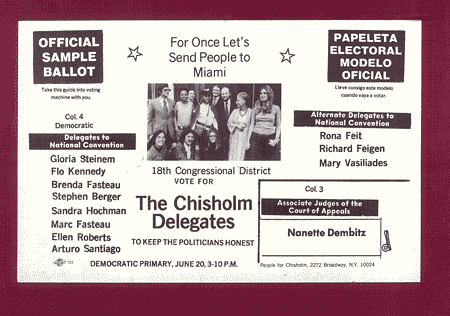
To Top
Books by Jo | What's New | About Jo | Photos | Political Buttons
Home | Search | Links | Contact Jo | Articles by Jo
